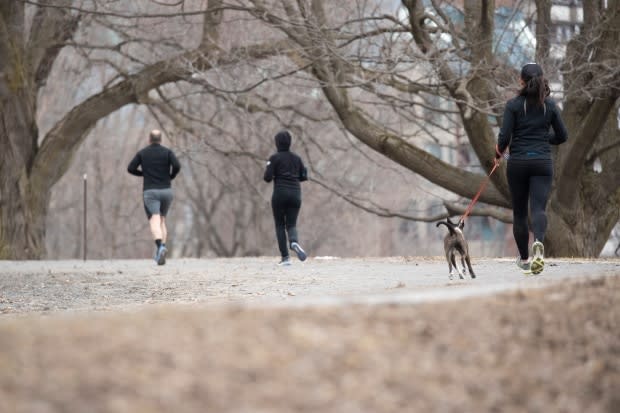So you've taken up jogging to fend off fat during the pandemic? Here are some tips
With the gyms closed and so many people now working from home, many are turning to jogging as a way to stay fit during the COVID-19 crisis.
Plenty of rookie runners have hit the city streets and green spaces, but running isn't as simple as strapping on a pair of sneakers and pounding the pavement.
Going it about it the wrong way can be discouraging or can easily lead to injury.
If you're one of those newbies, Montreal running coach Malcom Balk has a few tips to get the most out of your new pastime.
If you can't have a conversation, you're running too hard
Balk said that one of the biggest mistakes that a rookie jogger will make is that they go too hard, too fast.
People who live an active lifestyle but don't run regularly are the most at risk, he said.
"They're feeling a bit fit and a bit frisky, and their running muscles — the connective tissue in the lower legs — are not ready to deal with running."
Balk said this can lead to calf problems and shin problems which could ruin the experience and put the rookie runner back on the couch.
A good benchmark is a good conversation.

Balk said if it's possible to run with someone — two metres away, of course — and keep a conversation going. As long as you can do that, you are running at a good pace. If you can't talk, you're probably going too hard.
"It's probably best to back off and walk a little bit," he said.
"If you're out there just for an easy run, that's the criteria."
Balk said that you don't need to suffer in order to get something out of the activity. The key is the time spent on your feet, moving forward — not how fast you go.
Don't skip the warm-up
Getting a proper warm-up in before running is key to staying injury-free.
Too often new runners will be anxious to get to what they consider "the real workout," he said.
Starting your run with a brisk walk for 10 minutes can get the blood flowing, he said.
"If you've been sitting for awhile, it takes about 10 minutes for the brain to orient blood to the working muscles," Balk said.
"This is why most people feel terrible for the first 10 minutes because they're not giving their bodies a chance to make the changeover."
Balk said this is not just advice for rookie joggers — experienced runners often make this same mistake.

Running doesn't have to be boring
One of the biggest complaints Balk hears from new runners is that it's too boring an activity to keep them engaged.
"One of the ways to get the mind to not be bored is to push it a little bit," Balk said.
That's where intervals come in. Once you have warmed up, try running faster between every second set of hydro poles along your route.
This way, he said, the mind is actively thinking about when the next sprint is coming up — and when the next break is coming.
He concedes that these days, few runners, new or old, are complaining about boredom.
"I think for most people, just getting out of the house right now would be considered a bit of fun — even if they have to run."
Malcolm Balk, author of The Art of Running, holds the Quebec indoor track record for masters' 400-metre, 800-metre, 1,500-metre and 3,000-metre events in the 65- to 69-year-old age group.


